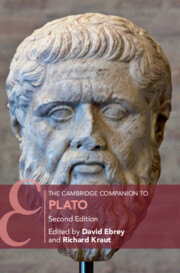Book contents
- The Cambridge Companion to Plato
- Other Volumes in the Series of Cambridge Companions
- The Cambridge Companion to Plato
- Copyright page
- Contents
- Contributors
- Acknowledgments
- Chronology
- Abbreviations
- 1 Introduction to the Study of Plato
- 2 Plato in his Context
- 3 Stylometry and Chronology
- 4 Plato’s Socrates and his Conception of Philosophy
- 5 Being Good at Being Bad: Plato’s Hippias Minor
- 6 Inquiry in the Meno
- 7 Why Erōs?
- 8 Plato on Philosophy and the Mysteries
- 9 The Unfolding Account of Forms in the Phaedo
- 10 The Defense of Justice in Plato’s Republic
- 11 Plato on Poetic Creativity: A Revision
- 12 Betwixt and Between: Plato and the Objects of Mathematics
- 13 Another Goodbye to the Third Man
- 14 Plato’s Sophist on False Statements
- 15 Cosmology and Human Nature in the Timaeus
- 16. The Fourfold Classification and Socrates’ Craft Analogy in the Philebus
- 17 Law in Plato’s Late Politics
- Bibliography
- Index Locorum
- General Index
- Other Volumes in the Series of Cambridge Companions (continued from page iii)
1 - Introduction to the Study of Plato
Published online by Cambridge University Press: 21 July 2022
- The Cambridge Companion to Plato
- Other Volumes in the Series of Cambridge Companions
- The Cambridge Companion to Plato
- Copyright page
- Contents
- Contributors
- Acknowledgments
- Chronology
- Abbreviations
- 1 Introduction to the Study of Plato
- 2 Plato in his Context
- 3 Stylometry and Chronology
- 4 Plato’s Socrates and his Conception of Philosophy
- 5 Being Good at Being Bad: Plato’s Hippias Minor
- 6 Inquiry in the Meno
- 7 Why Erōs?
- 8 Plato on Philosophy and the Mysteries
- 9 The Unfolding Account of Forms in the Phaedo
- 10 The Defense of Justice in Plato’s Republic
- 11 Plato on Poetic Creativity: A Revision
- 12 Betwixt and Between: Plato and the Objects of Mathematics
- 13 Another Goodbye to the Third Man
- 14 Plato’s Sophist on False Statements
- 15 Cosmology and Human Nature in the Timaeus
- 16. The Fourfold Classification and Socrates’ Craft Analogy in the Philebus
- 17 Law in Plato’s Late Politics
- Bibliography
- Index Locorum
- General Index
- Other Volumes in the Series of Cambridge Companions (continued from page iii)
Summary
This chapter offers a guide to reading Plato’s dialogues, including an overview of his corpus. We recommend first considering each dialogue as its own unified work, before considering how it relates to the others. In general, the dialogues explore ideas and arguments, rather than presenting parts of a comprehensive philosophical system that settles on final answers. The arc of a dialogue frequently depends on who the individual interlocutors are. We argue that the traditional division of the corpus (into Socratic, middle, late stages) is useful, regardless of whether it is a chronological division. Our overview of the corpus gives special attention to the Republic, since it interweaves so many of his key ideas, even if nearly all of them receive longer treatments in other dialogues. Although Plato recognized the limits inherent in written (as opposed to spoken) philosophy, he devoted his life to producing these works, which are clearly meant to help us seek the deepest truths. Little can be learned from reports of Plato’s oral teaching or the letters attributed to him. Understanding the dialogues on their own terms is what offers the greatest reward.
- Type
- Chapter
- Information
- The Cambridge Companion to Plato , pp. 1 - 38Publisher: Cambridge University PressPrint publication year: 2022
- 1
- Cited by

